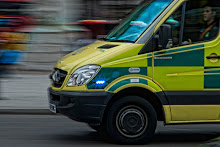Well, I felt like it was time for a rhyme. Or as a colleague put it:
I'm a poet
and I don't even know it
- ~ - Finish Interlude - ~ -
I think the idea that people call 911 out of ignorance is a flawed analysis. People call 911 inappropriately for two reasons.
1.) They have reached the end of their problem solving capability and need help. They don’t care if they are misusing the system. They care about getting help because they don’t know what to do. In their mind, that is an emergency.
2.) They are purposefully abusing the system for personal gain. Whether it is for controlled medications, in-home health care, a ride to somewhere closer to the hospital, attention, a warm bed or food, they want something that we provide and they don’t care if they have to game the system to get it.
I believe there is a group in between, 1.5 so to say: People who undeniably need help. They need advice. They need someone, but not us. They just don't know that yet.
Our Comms/Control/Dispatch should control and filter these calls out, and divert them to appropriate resources (paramedic practitioner, hospital at home, telephone advice, GP, psych services, talking clock.)
And as pointed out on my last post, it would help for all health professionals to work together, know what to expect from each other, and know how to use the other agencies resources appropriately. A great step forward for paramedicine would be to be recognised as a profession (registration in Australia, hint hint.)
Quote #2:
Notice something about both of these types of people. They both have a basic understanding of the 911 system. Educating them further on the appropriate use of 911 will not prevent their next call. Even if you could stop them from calling, their problems are so common that their will almost certainly be a new person to call tomorrow instead of them. And the process begins again.
As I stated above, education for caller type 1.5 will help. You can do your bit, it won't change the world, but we gotta work on it together. Sure the big changes have to occur on a management level, but we're the road warriors actually talking face to face to the people.
So in a way, we're all asking for the same thing: More options, or tools as Steve calls them. The bottom line remains: Our current model of 'send an ambulance out for everything and treat at ED/ER/A+E' is outdated (and too costly).
Apart from those minor points I don't agree with, a brilliant (I really mean brilliant) post by Steve.
I just wish more of our breed would adopt such attitudes.



